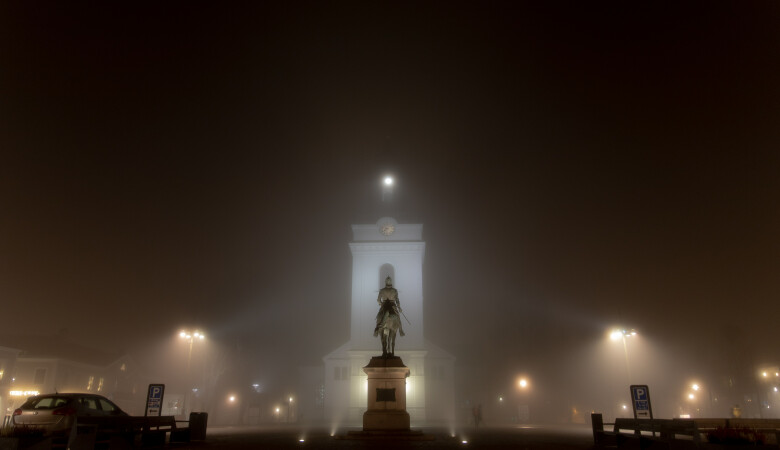The Glowing Heart of the Gospel, Part 3: Demonstration Through Christ (Romans Sermon 18 of 120)
May 14, 2000 | Andy Davis
Romans 3:21-26
Justice of God
I. Lenient Judges, a Sense of Injustice
Please, if you would, take your Bibles and open to Romans Chapter 3, as we continue in our series in Romans. And now, for the third time, looking at the verses, which I call, "The glowing heart of the center of the Gospel," Romans 3:21-26. And as we come to these verses again, I'm mindful of the need that we have to do this. I brought a magazine that someone gave me recently, US News & World Report. Did you see this cover article? "Why Was Jesus Killed?" To answer this question, you need to go to Romans 3:21-26, not to US News & World Report. Romans 3:21-26 answers this question.
Now, US News & World Report has their own answer: Jesus was killed, because He agitated against the Roman government in preaching the Kingdom of God in a confrontational manner. It was just a matter of time before His ignorance of political science, and just the way things worked in Palestine at that time overtook Him. And He succumbed, and was arrested against His will, and was crucified, and what a tragedy. That's their take on it. Is that the Apostle Paul's take on why Jesus was killed? Not at all. Not at all.
We've been seeing, as we look in this section, which I call, "The glowing heart of the Gospel," the answer to the question that Paul gives, that Jesus was killed for our justification, that Jesus was killed for propitiation, namely, that the wrath of God should be removed. And today, we're going to look at the fact that Jesus was killed for demonstration. For demonstration, those are the reasons that Paul gives.
Now, as we look about our society today, and we begin understanding some of the pressures, and the tensions that we're facing today, Reader's Digest gives a focus on this. Every month, they have a section in their journal called "That's Outrageous." And in "That's Outrageous," they talk about problems with the judicial system. And one of the biggest problems that they note, is that of lenient judges, judges that send hardened criminals back out on the street, because of technicalities, and loopholes. Well, that's exactly the issue that Paul's wrestling with here. How do people like us get past a judge like Him? How does that happen? And as we look at Romans 3:25-26, we come face to face with issues and problems that most of us are not wrestling with. We're not concerned about this.
Now, when it comes to theology, we feel very much that God needs to give an explanation of Himself, if anyone is ever sent to hell. But we don't feel the same need for an explanation, if anybody goes to Heaven. But Paul is addressing that today. How can sinners like us get past a judge like Him? How do we end up in Heaven? God must vindicate His justice. He must vindicate His righteousness and He does so in the cross of Christ. Our salvation actually presents a massive problem in Heaven. There's a big problem, given the fact that we're sinners, and given the fact that God is holy. And the issue is, how can God be both just and the justifier, of those who have faith in Jesus Christ? How can that be? And that's what Paul is wrestling through here.
Now, Issac Watts, a number of years ago, wrote one of my favorite hymns... And when I get to Heaven, I'll thank him for it... "When I Survey the Wondrous Cross." Isn't that a great hymn? And that the reason I love it, there's lots of reasons, but I love the word 'survey.' When you think of a survey, what do you think of? You think of a careful, long gaze, don't you? You don't think about a quick glance. You talk about a deep look at the cross of Christ. And when you survey the wondrous cross, what do you see? What do you see there? Do you see the love of God there? Well, I think you should, because the cross of Christ clearly demonstrates the love of God. Romans 5:8, "But God demonstrates His own love for us in this: While we're still sinners, Christ died for us." The cross of Christ demonstrates the love of God, doesn't it? But it demonstrates more than that. And I think it's sad sometimes, when we take just a glancing look at the cross of Christ, and not see all that's there. Because the cross of Christ demonstrates more than just the love of God; it also demonstrates the justice of God. And that's our focus today.
Now, realize, as we've been going through Romans, the central concern in Romans is the glory of God. I love that song that they just sang, "For God and God Alone." It just honors God to realize that we were created for His glory, created to enjoy Him, to walk in His presence moment by moment. For God and God alone we were created, for His glory. The problem is, that we have all, according to Romans, exchanged the glory of God, exchanged the idea of God and God alone, and moved it away, and put something created in His place. All of us have some different idol there, but that's what we've done. We've traded the glory of God for something less, an Esau-ish bowl of soup, something earthly, something not anywhere near as glorious as God. But that's what we've done. And so we have, all of us, despised the glory of God. We've thought little of it; it's small to us. And that's a problem.
II. The Central Concern for the Glory of God
The problem is, as we look through Scripture, we come to the realization that God has allowed many glory despisers into Heaven: Abraham, and Isaac, and Jacob, and David, Moses. All of these, in one way or another, at some time or other, despised the glory of God. And yet, there they are, in Heaven. How did that happen? Does God despise His own glory? Does He think it's a small matter, when these have despised His glory? And that's a problem. And what is the solution to the problem? Could it be that one who is saturated in the glory of God, one who lived and bleeds for the glory of God, should come and receive on Himself our sins, and for the glory of God, would die to restore the damage done by us glory despisers? Could that be the solution? I think it is. For Jesus said this in John 12:27, says, "Now, my hardest trouble and what shall I say? Father, save me from this hour? It was for this very reason I came to this hour." What's the next thing He said? "Father, glorify your name." That was the passion of Jesus' heart, wasn't it? At every moment, "Father, glorify your name, glorify yourself in me." Do you remember what happened at that moment? A voice came from Heaven, "I have glorified it and I will glorify it again."
The solution to the problem of the exchange of the glory of God, is the Son of God, who came and manifested the glory of God, and then died for that glory, and rose again for the glory. Now, we've been saying in Romans 3:21-26, that these verses are the Acropolis of the Bible. What I mean by that, is that it's elevated ground and the most important buildings are built on it. The themes in these verses are the center of the theology we call Christianity and any other ground in Scripture looks up to these themes. Listen now, again, to Romans 3:21-26, "But now, a righteousness from God, apart from law, has been made known, to which the law and the prophets testify. This righteousness from God comes through faith in Jesus Christ to all who believe. There is no difference, for all have sinned and lack the glory of God, and are justified freely by His grace, through the redemption that came by Christ Jesus. God presented Him as a propitiation through faith in His blood. He did this to demonstrate His justice, because in his forbearance, He had left the sins committed beforehand unpunished. He did it to demonstrate His justice at the present time, so as to be just and the one who justifies those who have faith in Jesus."
Now, we've seen that there are three major issues in these verses. First, justification through Christ. Remember what justification was. It was God's declaration as a judge that we were not guilty of our sin. It's His covering us with the righteousness of Christ, a righteousness that does not belong to us, so that we survive judgment day. We are declared righteous by God. The second step, last week, we looked at propitiation, which, as you remember, was the removal of all the wrath of God for our sins away, that Jesus was our lightning rod. He absorbed the wrath of God and carried it away from us, so that we would be safe. Propitiation through the blood of Christ.
III. Demonstration? Six Probing Questions
Now, today, we're going to look at demonstration and we're going to ask six questions of this issue of demonstration. First, demonstration by whom? Secondly, demonstration of what? Thirdly, demonstration why? Fourth, demonstration how? Fifth, demonstration when? And sixth, demonstration to whom?
1. Demonstration by Whom? - God
Let's start with the first, demonstration by whom? Verse 25, it says, "God publicly set Christ forth," is a good way to understand that word, "As a propitiation through faith in His blood." "God publicly set Jesus forth." There was a public display made of Jesus. We touched on this last time. Now, the key thing to understand, is it's God who's making the demonstration. God wants us all to see something in Christ. There's a demonstration made by God, and therefore, Christ was sacrificed by God the Father on purpose. Don't believe what you read in these magazines. This was no accident. Jesus didn't just stumble into a problem that was over His head, through His lack of knowledge of political science, got Himself into problems that He didn't understand. That's the way it goes. "And oh, what a tragedy. The world was just... Jesus was just too good for the world. They just couldn't understand His love, and they crushed Him, and what a tragedy." No, no, no. This is the wrong way to understand Jesus' death. It was all done on purpose. It was an orchestrated plan. He was handed over by God's set purpose and foreknowledge. It's not a mistake. It's not an accident.
Jesus Himself said this, "The reason my Father loves me, is that I laid down my life." This is John 10:17-18, "The reason my Father loves me, is I laid down my life, only to take it up again. I have the authority to lay it down and I have the authority to take it back up again. This command I received from my Father." What command? The command that He should lay down His life. What command? The command that He should take it up again; this command. This was not an accident. The Father commanded the Son to do this and the Son gladly obeyed. It was not an accident. The demonstration is done by God Himself. God sent Christ up on a cross high and lifted up, so everyone could see. It was a demonstration done by God.
Listen to Isaiah 53:10. Isaiah 53:10 says, "It was the Lord's will to crush Him and cause Him to suffer." "It was the Lord's will to crush Him and cause Him to suffer." Did He not love His Son? Of course, He loved His Son. It was the only way to demonstrate His justice, the only way to demonstrate His love for us as sinners. And so, it was God's will that Jesus suffered what He did on the cross. And as Peter said on Acts 2:23, "This man was handed over to you by God's set purpose and foreknowledge. And you, with the help of wicked men, put Him to death by nailing Him to the cross." It was not an accident. God made a public display of Christ. "Everyone, look at my servant! Everyone, look at my Son and see, survey the wondrous cross. Look at it, gaze at it, and understand." The demonstration was made by God.
2. A Demonstration of What? - Justice
A demonstration of what? What was He demonstrating? Well, Verses 25-26 answer the question. Verse 25, look at it, "God presented Him as a propitiation through faith in His blood. He did this to demonstrate His…" what? His justice. It was justice that He was demonstrating there. Alright, look down on Verse 26, "He did it to demonstrate His justice at the present time." Well, I tell you, when you get to thick theological verses like this, which have so much meaning and something is said twice, maybe we need to sit up and take notice. Paul says it twice: God was demonstrating justice through the cross of Christ. If you want to understand the justice of God, look to the cross. I would say, if you want to understand the love of God, look to the cross. You don't see the love of God shown any better than on a cross, and you don't see God's love for justice anymore than at the cross.
Now, what does it mean that God demonstrated His justice here? The Greek word is actually the same as the word 'righteousness,' exact same word. Well, how do we know that the translators in all the English translations were right to choose the word 'justice' here, rather than just the word 'righteousness?' It's because of the context. Well, understand in Verse 21, it says, "But now, a righteousness from God is revealed [or made known], to which the law and the prophets testify." That is a different kind of righteousness than we get in verses 25-26. That righteousness is what we call 'imputed righteousness,' it's a righteousness that God takes from His Son, Jesus, and puts on us as sinners. And He sees us that way. He sees us covered with the righteousness of Christ. This righteousness is different. This is the righteousness, whereby God judges rightly, and so it's rightly called justice. We're talking about justice, the ability to discern between right and wrong. Don't you need that in a judge? If a judge is going to be a good judge, he must be able to discern between right and wrong. He must understand the law, understand it perfectly. He must understand its penalties, and its transgressions, and how it is to work. He must know what every case equals and mete out accurate punishment for everyone, in order for him to be a just judge. And our God is a just judge, He loves justice.
In His commands, in Deuteronomy 16, He was talking to the judges of Israel and he said, "This is how you are to carry yourself in judging." In Deuteronomy 16, he says, "Do not pervert justice or show partiality. Do not accept a bribe, for a bribe blinds the eyes of the wise and twists the words of the righteous. Follow justice and justice alone, so that you may live and possess the land the Lord, your God, is giving you."
Now, when I was on a mission trip overseas in Pakistan, I came to realize that you didn't get anything from a government official, unless you gave him some chai. Now, you don't probably know what chai is. Chai is tea, but it really isn't tea they're wanting, and you're supposed to know that it's not tea they wanting, they want a little money. And so, if you want a government stamp, or a visa, or anything like that, there needs to be some chai given. It's a real problem for missionaries who try to behave ethically. But the same thing works in the judicial system as well, the seeking of a bribe. And according to Deuteronomy 16, what does a bribe do? It "blinds the eyes… and twists the words…" so that judge is no longer a just judge. God said, "Don't do it. Follow justice and justice alone, when you're behaving as a judge."
In Psalm 9:8 & 9:16 it says, "The Lord will judge the world in righteousness. He will govern the peoples with justice…The Lord is known by His justice." And even more tellingly, in Psalm 89:14, it says, "Righteousness and justice are the foundation of your throne." Read that again, "Righteousness and justice are the foundation of your throne." What does that mean? What that means, is that if our salvation is unjust, what happens to God's throne? It crumbles. The foundation is gone. Do you see now, why this is a massive problem? Because we just said, what does a bribe do to the eye of a judge? Blinds it. And doesn't it seem that God is constantly turning a blind eye to sin? When you look around this world, it seems that sinners prosper, right? The sun came up today on wicked people. The rain came down yesterday on wicked people. God seems to turn a blind eye all the time, and so we have a problem with God's justice, a pressing concern. God does seem to wink at all kinds of sin. And so God bids us to look at the cross, that we may understand His passion for justice.
3. Demonstration Why? - Grace and Mercy
The third question is, demonstration why? I've already begun to answer that question. Why do we need a demonstration of the justice of God? In Verse 25, it says, "He did this to demonstrate His justice, because in His forbearance, He had passed over the sins committed beforehand." "In His forbearance, He had passed over the sins committed beforehand." Psalm 103:10, it's a great verse. It says in Psalm 103:10, "He does not treat us as our sins deserve." Do you realize what that means? God never gives us what we deserve. We don't want what we deserve from God; we want grace and mercy, and God is a God of grace and mercy. He does not treat us as our sins deserve, but where does that leave His justice? And that's where the cross comes in. "God," it says here, "In His forbearance, had left the sins committed beforehand unpunished." Forbearance is God's self-restraint and His tolerance. God is tolerant and He restrains Himself. It's says in Romans 2:40, "You shall contempt for the riches of His kindness, tolerance, and patience [same word], not realizing that God's kindness leads you toward repentance. "
Well, the problem comes most acutely in the Old Testament. I want to tell you a familiar story and try to set it in light, in the context of what we're talking about here. In the spring, when kings usually go out to war, David didn't go. You know this story? David stuck around home and sent the army out to do the work of protecting Israel from its enemies. And idle hands are a devil's workshop, so also is an idle mind, or an empty mind. Our minds should be full of the glory of God, deeply, richly satisfied at every moment with the glory of God. And when we're not, we tend to roam. We tend to roam. And David roamed that night. He went out on the roof, and he noticed a woman, found out her name was Bathsheba, and he committed adultery with her, sinned, had her husband killed to cover over his sin, married the woman, and then just went on with life.
Maybe nine, maybe 10 months he went on, I don't know. A baby was born. He was still hardened in his sin, and God sent him a prophet, and the prophet's name was Nathan. Do you remember the story that Nathan told, when Nathan got David's emotions involved here? He told him that there was a rich man who had all kinds of cattle, and sheep, and everything that he could possibly want. And there was a poor man who lived near him who had just one little ewe lamb, just a little lamb, and he had no children, so he just treated it like one of his children. And a stranger came... Do you remember the story? A stranger came to the rich man, and instead of taking one of his huge flock to serve for dinner, this man stole the other man's little ewe lamb, slaughtered it, and fed it to the stranger. Do you remember what David did? Oh, he was angry. He was angry at that man. He said, "That man deserves to die for what he's done! He should pay fourfold." Remember the next words? Nathan said, "You are the man. You, you did this. You despised the Word of the Lord."
Now, someone could say... David would say, "I really actually wasn't thinking of the Word of the Lord at that particular moment. I wasn't." "Well, that's the whole problem. You should have been. God lavished blessings on you. God created your very body, your inmost being in your mother's womb, put you together. And then, He's lavished blessings on you that most people will never even see. You should've been thinking of God, and you weren't, and you weren't satisfied." David's heart was broken by this, broken. And he said, "I've sinned against the Lord." Do you remember the next thing that Nathan said? "You will not die." Now, wait a minute….Wait a minute… Didn't you say, God, the soul who sins will die? Didn't you give a command, "You shall not commit adultery"? Didn't you give another command, "You shall not murder"? What is this, "You shall not die"? I thought to myself, as I was preparing this sermon, how one could almost start to look at Nathan like that serpent in the Garden of Eden. You remember what the serpent said to Eve? "Don't worry about it, you're not going to die." "What is the deal?" But now, it's God saying it.
I'm going to make this come alive to you. It's Mother's Day. Let's suppose you were Uriah the Hittite's mother. Let's imagine you're Uriah's mother. Your boy, he's your pride and joy. He's grown up strong, and righteous, and true. He's come to believe in the God of Israel, and he's a loyal, honored... A man of honor, as the story proved, and he has a lovely wife, and some grandchildren, and just what a great family. And all of a sudden, this king comes along, and doesn't stay with one of his own wives, but instead, takes your son's wife, and then has your son killed to cover over his tracks. "I'm waiting for the court date. That's all, looking forward to the court date. I'm going to sit there and I'm going to rejoice, when he gets what's coming to him." And then you hear the news that God's prophet came, and said, "The Lord has taken away your sin. You will not die." Is this a problem for you, as Uriah's mother? Would this bother you?
I see it on the news all the time. There are actually victim's rights groups now, because of this feeling, this passion that comes over us for justice. We have it; it's in there. And if you don't think so, wait 'til it happens to a member of your family. There's a passion inside us for justice. Revenge is evil, but justice is a gift from God. Now, we have a problem, don't we? God Himself said, "You shall not die." And what are we going to do? God has just passed over this sin, hasn't He? And where is David now? Where is he?
He's in Heaven. What's he doing up there? Praising God, looking at God's face. What's he doing up there? Even more telling, what are you going to be doing up there? What am I going to be doing up there? Our God is a gracious God and we have to look at this issue: God's righteousness in justifying sinners. "He did it to demonstrate His justice at the present time, so as to be just [look at verse 26], And the one who justifies those who have faith in Jesus." Do you see this? Look at it again. "He did it to demonstrate His justice at the present time, so as to be just." God's very being is on the line here. He would be unjust, if it weren't for the cross. Many people think of salvation this way. Our God is a loving God. He's a merciful God. And so we are all sinners, God covers it with His love. Is that the cross? Is that the Gospel we're preaching? God just forgives it and lets us into Heaven. Is that right? That's only half the story. And I've learned from church history, and from theology, that half the story told as the whole story becomes an untruth, it becomes heresy. You got to tell the whole story; the other half is the justice of God. And God demonstrates that with Jesus Christ.
4. Demonstration How? - Propitiation
The fourth question we need to answer here, is demonstration how? In Verse 25, it says that, "God publicly set Christ forward as a propitiation through faith in His blood, in order to demonstrate His justice." The death of Christ is a public display of the justice of God. If I were to ask you to close your eyes. See the death penalty decreed by Pontius Pilate. See him washing his hands and think, "This is what a law breaker deserves." See the Romans whip Christ, and punish Him physically in preparation for the cross, and say, "This is what a law breaker deserves." See the heavy cross laid on Jesus' back, as He makes His way through the streets of Jerusalem to scorn and derision from his fellow countrymen, and think, "This is what a law breaker deserves. " See the hands and feet nailed to the wood, and see the blood flow, and think, "This is what a law breaker deserves." See the final breath exhaled from Jesus' mouth and think, "This is what a law breaker deserves." This is justice. It's not just human justice, it's divine justice. God did this.
And even deeper, see the spiritual side, see Jesus crying out, and saying, "My God, my God, why have you forsaken me?" And think, "This is what a law breaker deserves." This is what we deserved! See the skies darken with the clouds of God and think, "The wrath of God, this is what we deserve. This is what a law breaker deserves." And see in all of this, think, understand, God is doing this to His only begotten Son." I've said before, "Our salvation is free, but it wasn't cheap, was it?" It's free to us, but it cost God His only begotten Son. And in all the universe, is there anything as valuable to God, as His only begotten Son? "This is my Son, my only begotten Son, whom I love. With Him, I'm well pleased," He said. And He did it to His Son. Expensive, this display of righteousness, isn't it? Expensive, this display of justice, but God loves justice, and so He displayed it.
Now, you will say, "In a way, it's not fair, because Jesus never sinned, did He? How could this be a display of justice, if Jesus is suffering all these things, and was innocent, guiltless, and free?" Well, remember what we've been saying all along. God made Him who had no sin to be sin for us. God took our sins and laid them on His Son, so that in effect, before the eyes of God's justice, He was not innocent at the cross. In Himself, had committed no sin, but lived moment by moment for the glory of God. But at that moment, all of our sin were on Him and the justice of God lashed out against that sin. "He was pierced for our transgressions, crushed for our iniquities. The punishment that brought us peace was upon Him, and by His wounds, we are healed. We all, like sheep, have gone astray. Each of us has turned to his own way and the Lord has laid on Him, the iniquity of us all."
5. Demonstration When? - In 29 AD, and Every Time the Gospel is Preached
Next question, demonstration when? Well, it happened, as I said last week, at a certain time and place in history, outside the walls of Jerusalem, 29 AD. Not done in a corner, in open public display, as people passed by, Jesus Christ was crucified. And then, a little while ago, remember I said to you last week, it also happens whenever somebody faithfully preaches the cross. Galatians 3:1, he says, "You foolish Galatians. Who has bewitched you? Before your very eyes, Jesus Christ was publicly portrayed as crucified." Not with their eyes, but in their mind, by faith, they saw Him. And when I had you close your eyes, and when I was reciting those things, wasn't Jesus erected in your mind on a cross? Didn't you see Him? He was publicly displayed before you, as the Gospel's being preached. Demonstration when? At a specific time and place in history, and whenever that specific time and place in history is reported by a messenger of the Gospel.
6. Demonstration to Whom – All Creation
The final question is, demonstration to whom? In order for there to be a demonstration, there needs to be an audience. Who's the audience? Well, first, I think all of creation was the audience. It says very plainly, Isaiah 48:11, "My own hand laid the foundations of the Earth and my right hand spread out the Heavens. When I summon them, they all stand up together." All the Heavens are gathered together to look at this display. "Hear all Heavens, listen all Earth, for the Lord has spoken," Isaiah 1:2. And then, in Jeremiah 2:11-13, it says, "Has a nation ever exchanged its Gods, if they are not Gods at all? But my people have exchanged their glory for an idol. Be appalled at this, oh, Heavens, and shudder at this, oh, Earth." Okay, well, if the Heavens are going to be appalled and shudder at the sin, they need to see the display, and God put Jesus up on the display, for all Heaven to see.
Well, how about the holy angels? Are they observing? Is there a heavenly assembly? Is there a grouping of angels seated up there with God? Yes, there is. Listen to this, Psalm 89:5 and following, "The Heavens praise your wonders, oh, Lord, your faithfulness too, and the assembly of the holy ones." The assembly of the holy ones, those are angels. "For who in the skies above can compare with the Lord? Who is like the Lord among the heavenly beings? In the council of the holy ones, God is greatly feared." The images of a council of holy ones, of all the angels sitting up there in heavenly array, it says the same thing in Hebrews 12. It says, "You have come to Mount Zion in heavenly Jerusalem, the city of the living God. You have come to thousands upon thousands of angels in joyful assembly." There's a heavenly assembly and angels; they see it all, they're great watchers.
How would it be for them, for God to let a bunch of sinners like us into Heaven without the cross? They'd be aghast. They're watching it all. And so the display is made before them. The angels see the display of the cross of Christ. How about Satan and his demonic hoard? They see it too. Colossians 2, it says that, "God disarmed the powers and authorities, and made a public spectacle of them, triumphing over them by the cross." He triumphed over Satan and over his hoard of demons. In Ephesians 3, "His intent was that, now, through the church, the manifold wisdom of God should be made known in the heavenly realms…" to all the heavenly beings, including demons. They saw it.
In Zachariah 3, "Then he showed me Joshua, the high priest, standing before the angel of the Lord, and Satan standing at his right hand to accuse Him." It'd be the picture of judgment day, and Satan standing, pointing at you, and accusing you of all your sins, bringing a charge against you, because of all your sins. Have you ever pictured that? And because of the cross, do you know what God's going to say? Who will bring a charge against those whom God is justified? It is God who justifies. Who is He that condemns? Well, where does He have the power to say that? From the cross. "I've cleansed them. I've justified them, because of Jesus." And so Revelation 12:10-11, "For the accuser of our brethren [that's Satan], who accuses them before our God, day and night, has been hurled down. They overcame him by the blood of the lamb and by the word of their testimony." How are you going to shut that accusing mouth, by the love of God? No, by the justice of God displayed in the cross. It is the justice that will shut his mouth. The final audience is us, folks, every tribe, and language, and people, and nation. We see the display of the justice of God.
Matthew 12:18 and following, "Here is my servant whom I have chosen, the one I love and whom I delight. I will put my Spirit on Him and He will proclaim justice to the nations. A bruised reed He will not break and a smoldering wick He will not snuff out, until He leads justice to victory. In His name, the nations will put their hope." We go to the ends of the Earth, to the distant islands, with the message of the justice of God in the cross of Christ. Not just the love of God, the justice of God. And the display occurred when Jesus was lifted high on the cross. John 12:31, it says, "Now, is the time for judgment on this world, and now, the Prince of this world will be driven out, that I, when I am lifted up from the Earth, will draw all men to myself. He said this to show the kind of death He would die." Jesus dying on a cross, an open display to the whole world. Folks, it's an open display to your co workers. It's an open display to your relatives who don't know Jesus yet. It's an open display to you, to know that your salvation is on a solid rock of justice, which cannot be moved.
IV. Are You Included?
Now, how do you know that you're included? Three points of contact. Look down on your outline. Romans 3:22, it says, "This righteousness from God comes through faith in Jesus Christ." Faith, that's how you know. Verse 25, "God presented Christ as a propitiation through faith in His blood." Faith connects you to the propitiation, and faith also connects you to the demonstration. Verse 26, "So as to be just and the one who justifies," who? "Those who have faith in Jesus Christ."
The final point of application's rich and strong, and I want you to use it this week. Turn in your Bibles to First John Chapter 1. I discovered something about this verse a long time ago, and now, that we have talked openly about the justice of God, this verse will have its full impact on you. 1 John 1:8-9 "If we claim to be without sin, we deceive ourselves and the truth is not in us." Look at verse Nine, "If we confess our sins…" What does it say? "He is faithful," and what? "Just." Just to what, send us to hell? Just to forgive us. Now, how in the world did the justice of God now work for our forgiveness? How did that occur? Why is it we can go now and say, "God, because of your justice, forgive my sin." Well, I've explained it this whole morning. There was a transfer of guilt to Jesus and He suffered already for those sins. It would, therefore, be unjust to whom for God to not forgive you? It would be unjust to Jesus. There was a covenant made between Father and Son. Son said, "If I die for them, you must forgive them." And Father said, "Delighted to do it. Delighted to do it." He is faithful and just, not to condemn, but to forgive. Therefore, come and confess your sins, based on the justice of God, and He will forgive you. Why don't we close in prayer?






























